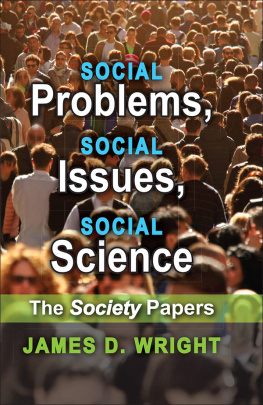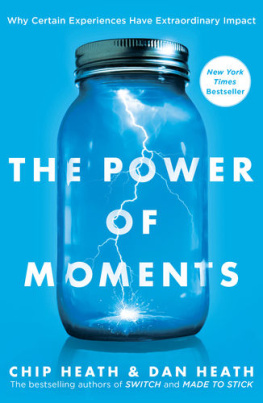To Alex and his generationlet us work to make a more humane and just world.
FOR INFORMATION:
SAGE Publications, Inc.
2455 Teller Road
Thousand Oaks, California 91320
E-mail: order@sagepub.com
SAGE Publications Ltd.
1 Olivers Yard
55 City Road
London EC1Y 1SP
United Kingdom
SAGE Publications India Pvt. Ltd.
B 1/I 1 Mohan Cooperative Industrial Area
Mathura Road, New Delhi 110 044
India
SAGE Publications Asia-Pacific Pte. Ltd.
3 Church Street
#10-04 Samsung Hub
Singapore 049483
Copyright 2016 by SAGE Publications, Inc.
All rights reserved. No part of this book may be reproduced or utilized in any form or by any means, electronic or mechanical, including photocopying, recording, or by any information storage and retrieval system, without permission in writing from the publisher.
Printed in the United States of America
Library of Congress Cataloging-in-Publication Data
Crone, James A.
How can we solve our social problems?/James A. Crone.Third Edition.
pages cm
Revised edition of the authors How can we solve our social problems?, 2011.
Includes bibliographical references and index.
ISBN 978-1-5063-0483-0 (pbk.: alk. paper)
1. Social problems. 2. Sociology. 3. Social problemsUnited States. 4. United StatesSocial conditions21st century. I. Title.
HN18.3.C76 2016
306.0973dc232015027937
This book is printed on acid-free paper.
Acquisitions Editor: Jeff Lasser
Editorial Assistant: Alexandra Croell
Production Editor: Bennie Clark Allen
Copy Editor: Michelle Ponce
Typesetter: C&M Digitals (P) Ltd.
Proofreader: Rae-Ann Goodwin
Indexer: Wendy Allex
Cover Designer: Glenn Vogel
Marketing Manager: Johanna Swenson
Preface to the Third Edition
How can we solve our social problems? For example, how can we solve the problem of poverty or the worlds population problem? We have certainly made progress in dealing with a number of social problems. We have college student loans for poor people to allow them to get ahead in life. We have passed civil rights laws so that all Americans can vote and go into public places, such as restrooms, restaurants, hotels, and parks. We have health care for older people (Medicare) and for poor people (Medicaid), and with the Affordable Care Act, we are starting to offer more affordable health insurance for millions of Americans whose companies and businesses do not offer health care.
How can we solve more social problems for our fellow Americans and fellow humans of the world? For example, can we someday provide health care for all Americans, can we get more Americans out of poverty by providing jobs that pay above poverty-level wages rather than pay below poverty-level wages, can we stop the warming of our planet by decreasing the production of carbon dioxide and other pollutants by using more wind, water, and solar energy to create a cleaner, healthier, and more survivable environment, and can we slow the growth of the worlds population so that current and future humans can share more of the resources we have and hence have a higher standard of living instead of existing in dire poverty for generation after generation? I believe that we can tackle these above problems and, in the coming pages, I discuss specific steps we can take to decrease or solve our social problems.
I outline a number of realistic steps we can take to solve or at least decrease the severity of a number of social problems. Notice that I say can rather than should. I present what we can do, but you will need to decide what we should do. As a sociologist, I cannot answer the should question for you because a science (natural or social) can deal only with the is part of phenomena, that is, description, causes, consequences, and prediction. Consequently, as you make your way through the book and read and think about how we can solve each social problem, I also want you to think about what we should do.
As you read the chapters, I remind you from time to time how challenging it will be to solve our social problems. In , for example, I discuss a number of barriers we face when we try to solve our social problems. By discussing these barriers and making them conscious in your mind, I do not intend to make you feel that the situation is hopeless. What I do intend is to urge you to develop a realistic outlook. Neither a pessimistic outlook nor a naive outlook will help us solve our social problems. To address these problems, we need to have a realistic outlook where our feet are firmly planted on the ground and where we are open to new ideas and possibilities that will give us hope that we can indeed solve our social problems.
Acknowledgments
I thank all of the reviewers who made many constructive suggestions to improve this book: Chris Adamski-Mietus (Western Illinois University); Elsa Valdez (CSU, San Bernadino); and Laci A. Fiala (Walsh University). I greatly appreciate their time, effort, and insight. At SAGE Publications, I thank the acquisitions editor, Jeff Lasser, and his editorial assistant, Alexandra Croell, for their patience and continual support of me and my work. I am grateful to production editor Bennie Clark Allen for making the production process go smoothly and to copy editor Michelle Ponce, who did a superb job in making this book flow much more smoothly. Finally, I thank the hundreds of students I have taught in social problems courses over the years who have asked important and challenging questions and created enlightening discussions that, collectively, were the stimulus for my writing this book.
About the Author
James A. Croneearned his PhD in sociology at the University of Kansas. For 33 years, he taught seven sociology courses in the Department of Sociology and Anthropology at Hanover College. Over the years, he served as chair of the department and as chair of a number of faculty committees. He won the Arthur and Ilene Baynham Award for Outstanding Teaching. He has published articles on the sociology of sport and teaching sociology and edited the book
15 Disturbing Things We Need to Know. He has served the larger community by being president of the Hanover Town Council, president of the local chapter of Habitat for Humanity, and member of the Jefferson County Council. He ran for the U.S. Congress in 2012 and is currently chair of the Jefferson County Democratic Party. In his leisure time, he likes to work out and play basketball, especially with people considerably younger than he is. His son, Alex, is a mechanical engineering student at the University of Southern California.












